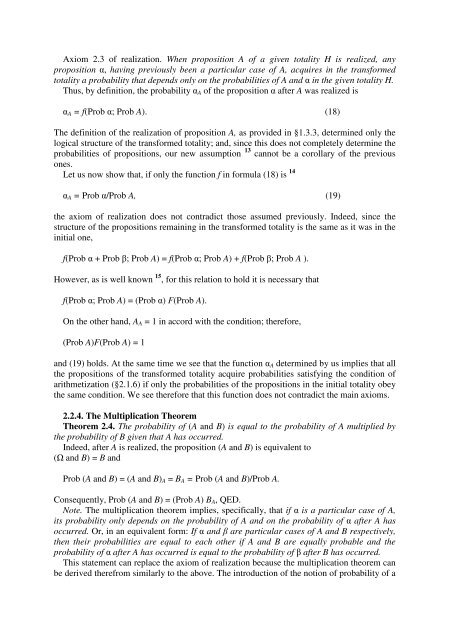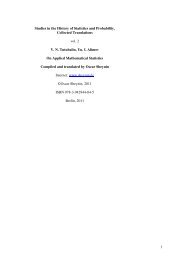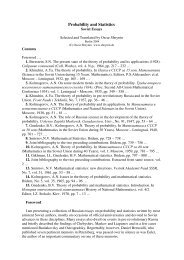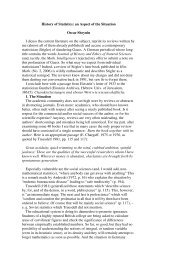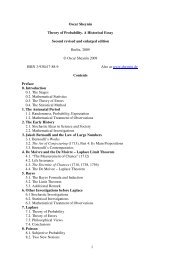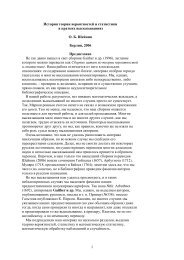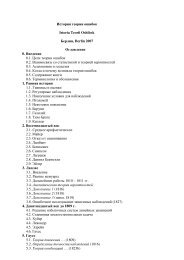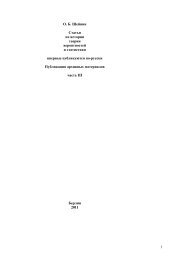kniga 7 - Probability and Statistics 1 - Sheynin, Oscar
kniga 7 - Probability and Statistics 1 - Sheynin, Oscar
kniga 7 - Probability and Statistics 1 - Sheynin, Oscar
Create successful ePaper yourself
Turn your PDF publications into a flip-book with our unique Google optimized e-Paper software.
Axiom 2.3 of realization. When proposition A of a given totality H is realized, anyproposition , having previously been a particular case of A, acquires in the transformedtotality a probability that depends only on the probabilities of A <strong>and</strong> in the given totality H.Thus, by definition, the probability A of the proposition after A was realized is A = f(Prob ; Prob A). (18)The definition of the realization of proposition A, as provided in §1.3.3, determined only thelogical structure of the transformed totality; <strong>and</strong>, since this does not completely determine theprobabilities of propositions, our new assumption 13 cannot be a corollary of the previousones.Let us now show that, if only the function f in formula (18) is 14 A = Prob /Prob A, (19)the axiom of realization does not contradict those assumed previously. Indeed, since thestructure of the propositions remaining in the transformed totality is the same as it was in theinitial one,f(Prob + Prob ; Prob A) = f(Prob ; Prob A) + f(Prob ; Prob A ).However, as is well known 15 , for this relation to hold it is necessary thatf(Prob ; Prob A) = (Prob ) F(Prob A).On the other h<strong>and</strong>, A A = 1 in accord with the condition; therefore,(Prob A)F(Prob A) = 1<strong>and</strong> (19) holds. At the same time we see that the function A determined by us implies that allthe propositions of the transformed totality acquire probabilities satisfying the condition ofarithmetization (§2.1.6) if only the probabilities of the propositions in the initial totality obeythe same condition. We see therefore that this function does not contradict the main axioms.2.2.4. The Multiplication TheoremTheorem 2.4. The probability of (A <strong>and</strong> B) is equal to the probability of A multiplied bythe probability of B given that A has occurred.Indeed, after A is realized, the proposition (A <strong>and</strong> B) is equivalent to( <strong>and</strong> B) = B <strong>and</strong>Prob (A <strong>and</strong> B) = (A <strong>and</strong> B) A = B A = Prob (A <strong>and</strong> B)/Prob A.Consequently, Prob (A <strong>and</strong> B) = (Prob A) B A , QED.Note. The multiplication theorem implies, specifically, that if is a particular case of A,its probability only depends on the probability of A <strong>and</strong> on the probability of after A hasoccurred. Or, in an equivalent form: If <strong>and</strong> - are particular cases of A <strong>and</strong> B respectively,then their probabilities are equal to each other if A <strong>and</strong> B are equally probable <strong>and</strong> theprobability of after A has occurred is equal to the probability of after B has occurred.This statement can replace the axiom of realization because the multiplication theorem canbe derived therefrom similarly to the above. The introduction of the notion of probability of a


